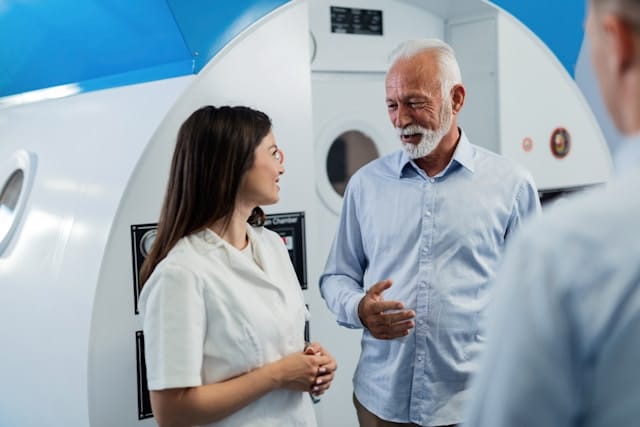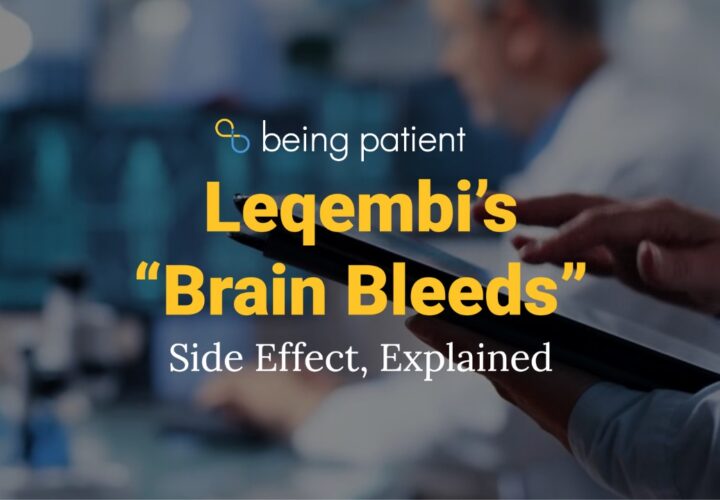The drugmakers behind Leqembi and Kisunla didn’t clue participants in if they had a higher risk of side effects during these drugs’ clinical trials. But now that the link between side effects and genetic risk is clearer cut, have companies started disclosing these risks? Being Patient investigated.
Your genetics could make you more vulnerable to the side effects of the new class of Alzheimer’s drugs.
Carrying two copies of the ApoE4 gene increases the risk of side effects, like brain swelling and small brain bleeds (ARIA), from anti-amyloid drugs like Leqembi and Kisunla. While most cases are mild or asymptomatic, a small percentage of people develop serious complications including, in rare cases, death. But when drugmakers started their Phase 3 trials for these drugs in 2019 and 2020, they didn’t tell trial participants whether they carried the risk.
The evidence linking people with ApoE4 to ARIA wasn’t clear-cut at the time. Some experts who spoke with Being Patient argued that companies didn’t tell participants as a result. Others argued that participants should have been warned anyway. Now that the risk is clear, has genetic disclosure become standard in anti-amyloid trials? We looked into it. Here’s what we learned.
How are drugmakers dealing with genetic disclosure in trials?
Many clinical trials of anti-amyloid drugs that started in the last few years have allowed participants to know whether they carry the ApoE4 gene at the start of the trial.
Roche
Roche is currently testing the anti-amyloid trontinemab in a phase 1/2 trial that started in 2021. Trontinemab is an anti-amyloid antibody with a brain transporter that helps it sneak across the blood-brain barrier. So far, the drug has a very low rate of brain swelling and bleeding, known as amyloid-related imaging abnormalities, or ARIA, but Roche’s spokesperson told Being Patient that the company needs to collect more data before they know for sure.
However, the drug company did not tell participants whether they carried the ApoE4 gene at the start of the study.
As of 2022, Roche’s anti-amyloid trials allow participants to learn whether they have the ApoE4 gene at the start of trials. That year, Roche ran a Phase 3 trial of the drug ganterenumab, which was terminated early, allowing participants to learn their ApoE4 status — and whether they were at an elevated risk of ARIA risk — at the start of the trial.
Moving forward, Roche plans to allow participants to learn whether they carry the ApoE4 gene at the start of its current and future anti-amyloid trials. A spokesperson told Being Patient that the link between ApoE4 carriers “has now been established as a key risk factor for ARIA with standard anti-amyloid monoclonal antibodies” for Alzheimer’s disease, necessitating disclosure.
Eisai
Eisai, the drugmaker that developed Leqembi in partnership with Biogen, is currently running two clinical trials.
The AHEAD 3-45 study, launched midway through 2020, tests whether Leqembi can prevent Alzheimer’s disease in cognitively healthy people who are at risk. The second study, launched last year, assesses whether a combination treatment of Leqembi and an anti-tau antibody can slow the disease in its early stages.
A spokesperson for the company confirmed that both trials allow participants to find out if they carry the ApoE4 gene at the start of the trial. As for future trials, the spokesperson said that the company “is not planning to conduct any additional anti-amyloid trials.”
Eli Lilly
Eli Lilly’s anti-amyloid drug Kisunla was approved by the FDA last year.
Lilly is now conducting more clinical trials to test Kisunla and a newer anti-amyloid drug called remternetug. One ongoing remternetug trial and one Kisunla trial, started in 2021 and 2024, respectively, allow participants to learn whether or not they have the ApoE4 gene at the start of the trial.
However, three other active trials don’t provide this option to participants:
- TRAILRUNNER ALZ-1, which started in 2022, to test remternetug in early Alzheimer’s disease.
- TRAILBLAZER ALZ-5, which started in 2022, to test Kisunla in early Alzheimer’s outside the U.S.
- TRAILBLAZER ALZ-6, which started in 2023, to test whether different dosing regimens of Kisunla lead to a lower risk of brain bleeding and swelling
“Lilly’s trial protocols are based on current science, available evidence, the specific patient population, and our ethical and legal responsibilities,” a spokesperson told Being Patient. “We are committed to following the science and will continue to reassess these factors and adapt our protocols as the science evolves.”
AbbVie
AbbVie started a Phase 2 trial of its anti-amyloid drug, ABBV-916, in late 2022 but terminated the development of the drug in 2024 due to what a spokesperson explained were “strategic business decisions.”
In the trial, ApoE4 status was determined by a third party, and the information was related to the researchers running the trial. It was up to the researchers, not the company, to decide whether or not to share the information with participants.
“AbbVie was not involved in this disclosure process,” the spokesperson said.
Overall trends
In our previous reporting, neurologists and experts argued that the link between ApoE4 and ARIA wasn’t as apparent when Eisai and Eli Lilly began planning their pivotal Phase 3 trials, which started in 2019 and 2020, respectively. Now, there is little ambiguity.
As a result, almost all the anti-amyloid trials in the U.S. run by the three major drugmakers—Roche, Eisai, and Eli Lilly—allow participants to find out whether they carry a genetic risk before the start of the trial. Eisai started providing proactive disclosure in newly registered trials in 2020, and Roche began in 2022. In contrast, one of Eli Lilly’s trials, which started recruiting participants abroad in 2022, does not provide proactive disclosure.
Here’s a breakdown of key anti-amyloid trials and whether they disclose genetic risk to participants:
| Company | Drug | Trial Name | Trial Start Date | Ongoing? | Recruiting? | Proactive Disclosure? |
|---|---|---|---|---|---|---|
| Roche | Ganterenumab | GRADUATE I and II | 2021 | No | No | No |
| Roche | Trontinemab | Brainshuttle-AD | 2021 | Yes | No | No |
| Roche | Ganterenumab | SKYLINE | 2022 | No | No | Yes |
| Eisai | Leqembi | CLARITY-AD | 2019 | Yes | No | No |
| Eisai | Leqembi | AHEAD-3,45 | 2020 | Yes | No | Yes |
| Eisai | E2814 + Leqembi | Study of E2814 With Concurrent Lecanemab | 2024 | Yes | Yes | Yes |
| Eli Lilly | Kisunla | TRAILBLAZER-ALZ 2 | 2020 | Yes | No | No |
| Eli Lilly | Kisunla | TRAILBLAZER-ALZ 3 | 2021 | Yes | Yes | Yes |
| Eli Lilly | Kisunla | TRAILBLAZER-ALZ 5 | 2022 | Yes | Yes | No |
| Eli Lilly | Kisunla | TRAILBLAZER-ALZ 6 | 2023 | Yes | No | No |
| Eli Lilly | Remternetug | TRAILRUNNER-ALZ 1 | 2022 | Yes | No | No |
| Eli Lilly | Remternetug | TRAILRUNNER-ALZ 3 | 2024 | Yes | Yes | Yes |





I was in the Biogen Aduhelm study and was not told of my apoe4 status. (I had mine done in a private lab). I have apoe4/apoe4. I knew the risk of ARIA when I signed up but at the time i did not know the increased risk by being apoe4/apoe4. I would have done the infusions anyway.
Hi Dewayne, great to hear from you and thank you for sharing your experience with the Aduhelm trial. It’s important to hear from those directly involved in research like this. We’re glad you’re part of this conversation and community.
I should just like to flag up the fact that not all testing is accurate. I lived with the worry of two copies of the APOE4 gene for a decade after testing by 23and Me. I joined a research project in London where I discovered I actually had only ONE copy, later confirmed by 23and Me retesting and hugely reducing my chances of succumbing to Alzheimer’s
Hi Jane, Thank you for sharing. it’s an important reminder about the limitations of direct to consumer genetic testing. We’re glad you were able to get clarity, and we appreciate you being part of this conversation. Take care.
I’m in the Eli Lilly Trailblazer-3 trial. Contrary to what it says here, I was never told I could information about my APOE4 status
Thank you, Being Patient, for your ongoing coverage of the Alzheimer’s Disease drug studies. As a result of my not being told my APOE-4 status and its risk implications I suffered symptomatic ARIA-E and ARIA-H in a TrailRunner study resulting in stroke symptoms, hospitalization, ongoing seizures, ADHD and brain shrinkage. Be careful out there!! Know your APOE-4 status.
Thank you for sharing your experience, Kristine. Stories like yours highlight the importance of transparency and informed consent in clinical research. If you’re interested in staying updated on new treatments and clinical trials, feel free to sign up to our quarterly Trials Update newsletter here: https://www.beingpatient.com/bp-trials-updates/?utm_source=organic&utm_medium=social – take care.
According to 23&Me I have 2 APOE markers. Are there any trial for people like me? How can I get on a list? Very interested in slowing the progression BEFORE I show marked symptoms.
My paternal grandma had severe dementia and my Dad died of Alzheimer’s in 2021.
Hi David, thank you for sharing your story. There are prevention-focused trials for people with APOE markers, like the AHEAD Study. If you’re interested in staying updated on new treatments and clinical trials, feel free to sign up to our quarterly Trials Update newsletter here: https://www.beingpatient.com/bp-trials-updates/?utm_source=organic&utm_medium=social – take care.
I am in the BLIND Ahead study in Canada . 2 ApoE4 genes . Side effects were disclosed before the study (I intentionally did not read them until AFTER I experienced some side effects )
I have had 3 small brain bleeds discovered by routine MRI’s .
First 2 years I was receiving biweekly , now receiving monthly . By week 3 , I start to “search for words “ .
This is such important research and I am thankful to participate!
My brother passed from LBD -any research into any form of dementia is appreciated.